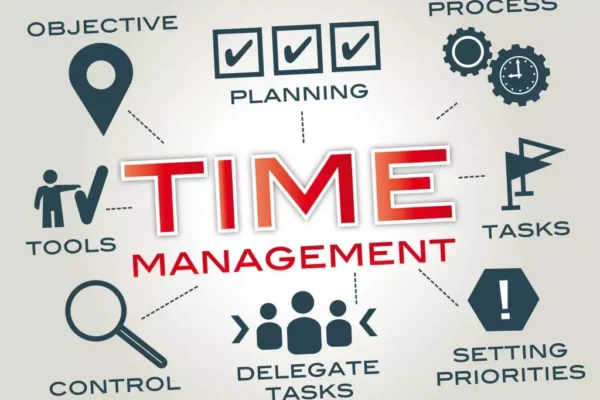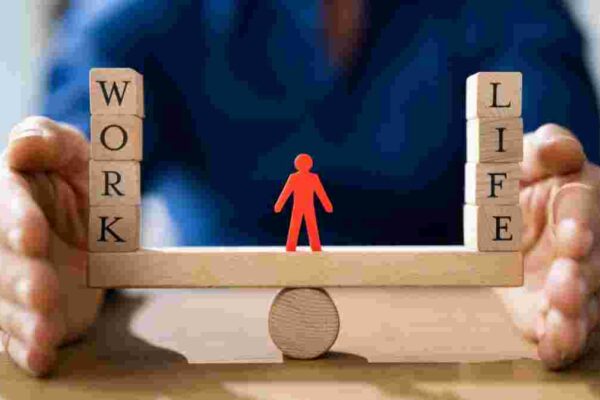
Why do you get out of bed in the morning? Why do you eat, brush your teeth, go to school or work, or exercise? You don’t have to do any of these things, yet many of us do. Why? Motivation is what makes us to do things that can sometimes be challenging or boring.
What is a basic model of motivation?
Your motivation to act comes from your needs. You need to eat to survive, you need to brush your teeth to keep them healthy, and you need to work to earn money to be able to buy food and pay your rent. Needs can come in many different forms – some needs are more emotional, like the desire to do well on an exam, and some are biological, like the need to drink a glass of water when you’re thirsty. Your needs may change throughout your lifespan – your thoughts, beliefs, feelings, environment, culture, and social relationships all come into play as you decide what you need at a particular moment in time.
If your needs are not met, you might feel like you’ve lost your purpose or like something is missing from your life. When you feel that way, you may try to fill the gap in your life and fulfill your needs. For example, if one of your needs is to go to medical school, you will be motivated to take biology and chemistry classes, study hard, earn good grades, and fill out applications to schools that you like. If you’re accepted into medical school, you will have successfully fulfilled your need (and will feel great!), but you’ll also probably have a new need – to graduate from medical school! If you aren’t accepted then you’ll still feel like something is missing, and you’ll either keep trying to achieve your goal and apply to programs again, or you may decide that a different career would be better for you and choose a new goal to work towards.
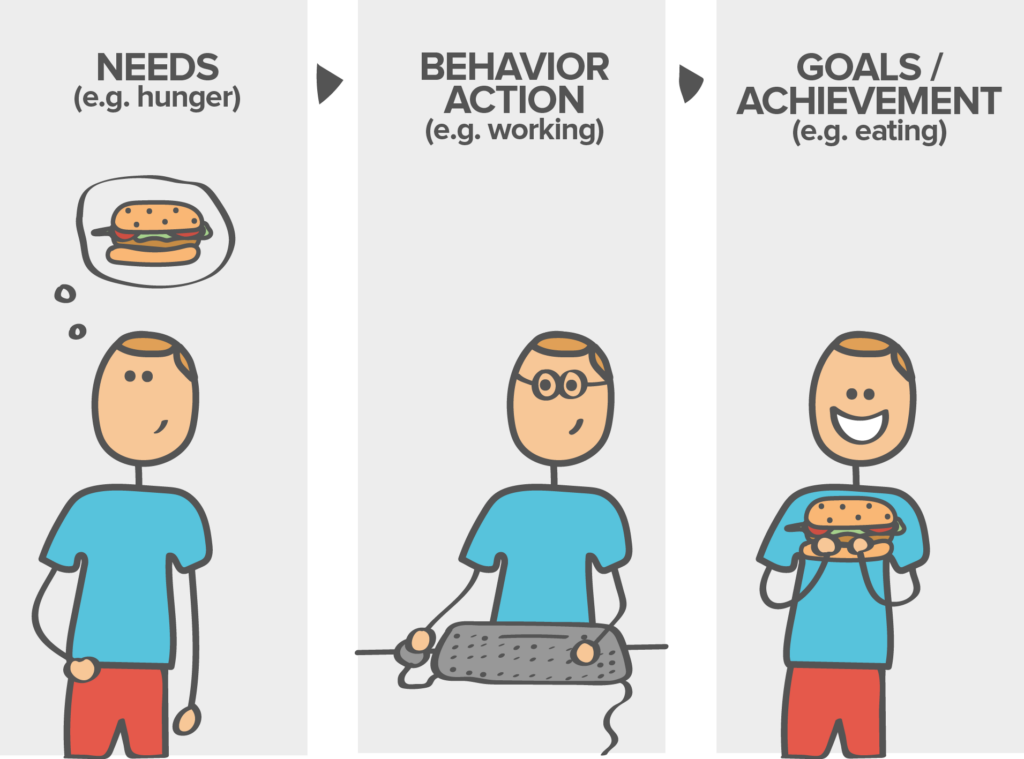
What are different types of needs?
Motivation theories focus on the relative importance of different kinds of needs, which can be put into three basic categories: physiological needs, psychological needs, and learned needs.
- Physiological needs are innate, biological, and must be met in order for you to survive. Some basic examples of physiological needs are things like hunger, thirst, and pain avoidance, which are all regulated by your body’s internal systems and are feelings that you have from the day that you’re born. Motivation theories that focus on physiological needs emphasize the importance of homeostasis, or processes that your body uses to keep your internal systems balanced and stable (like temperature regulation), and your body’s natural tendencies throughout the day (like your circadian rhythm). One motivation theory based on physiological needs is drive reduction theory, which suggests that motivation comes from your desire to reduce internal tension, which is a signal from your body that something is off and you need to act to survive. For example, you feel hungry because your body releases hormones at specific times throughout the day. You eat a burger to reduce that hunger, which restores balance in your body. In the same way, when you have a headache, you take medicine to reduce the pain you feel – your body is telling you that something is wrong, and you have to act in a way that fixes the problem.
- Psychological needs are based on your thoughts, feelings, beliefs, expectations, and self-image. Psychological needs are important for your mental health and happiness, and to create balance and harmony in your mind. One theory that focuses on psychological needs is cognitive dissonance theory, which suggests that when there are significant differences between what you think or believe and how you act, you feel uncomfortable or unhappy. Your discomfort makes you want to change your behavior so that you’ll feel better. For example, if you believe that dishonesty is awful and makes you a bad person, lying would probably make you feel really uncomfortable, anxious, and upset. You would keep feeling uncomfortable until you acted differently, in a way that is more consistent with your beliefs and thoughts – which would mean telling the truth. Once you tell the truth, you will feel relieved and your anxiety will be gone.
- Learned needs are needs that come from your experiences and are heavily influenced by things that happen to you throughout your life. You learn to want things like praise, money, success, and pleasure – you aren’t born with the goal of becoming a CEO or opening a business, that is something that you learn to want. One learned needs theory, incentive theory, suggests that any experience that is connected to a reward will make you more motivated to act. For example, some libraries offer a pizza party to children who read a dozen books over the summer. If a child wants the prize, she will work hard and be motivated to read the books. As an adult, a financial bonus or reward from your job is a common learned need. For example, my brother is a sales representative for a snowboard company. If he sells the most boards during the year, he earns a free snowboarding trip to Canada. Because he really loves to snowboard and wants the bonus, he learned to work harder and longer during the snowboarding season and he usually wins it! Learned needs can also be the result of social relationships and culture. For example, if my brother married a woman who felt wealth and status were really important, he might shift his goals – instead of being motivated to win a snowboarding trip, he would be motivated to work hard and earn extra money so that she could have the lifestyle she wants.
Are all needs equally important?
Everyone has different feelings about what needs are most important to them, but one psychologist believed that you can’t grow as a person until your basic needs (like ones related to survival) are met. His name was Abraham Maslow, and he created the Hierarchy of Needs theory.
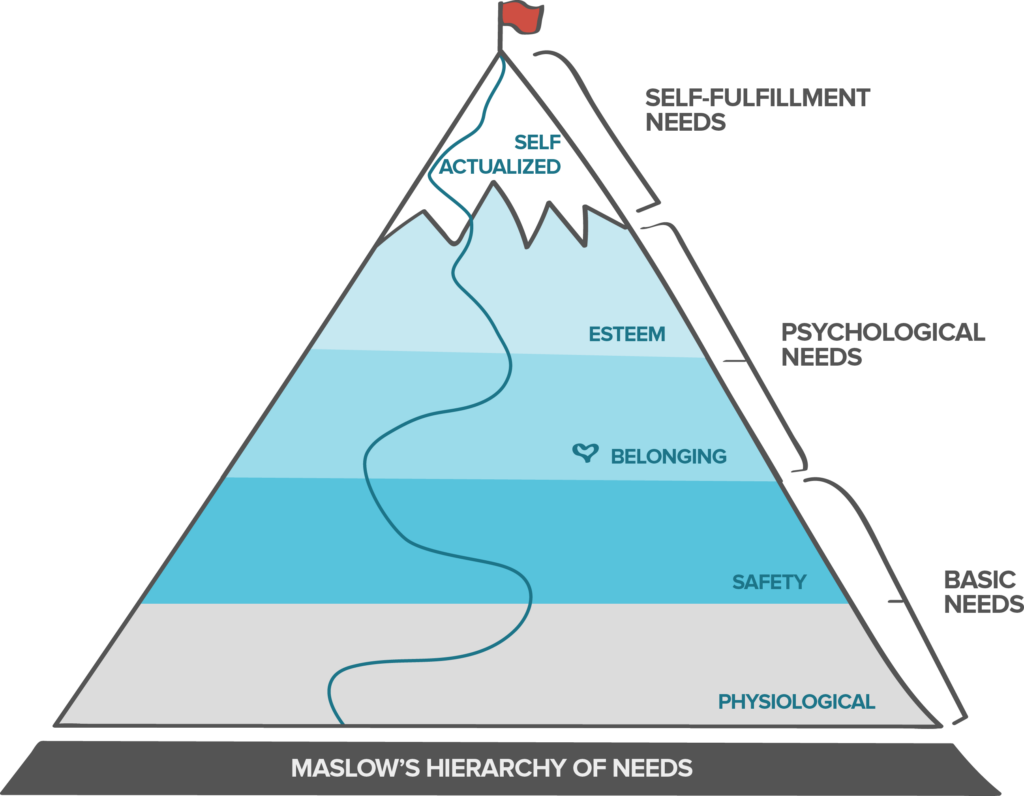
His theory placed needs into three separate categories – basic needs, psychological needs, and self-fulfillment needs. The basic needs like food, water, air, and a safe place to live have to be met before you can try to reach other goals, like having friends or positive self-esteem. As you fulfill needs from the bottom of the pyramid, you are able to pursue goals that lead to your happiness and personal growth. For example, if you are homeless, do not have enough to eat, and do not live in a safe environment, you probably won’t be as interested in expressing yourself creatively or finding prestige at work. If you are safe and secure in a loving environment, you are more likely to want to strive for achievement at work or in your community. Maslow believed that you are motivated to become your best self and will work to achieve self-actualization, which means you are your best, most creative and happy self!
What is intrinsic and extrinsic motivation?
The terms “intrinsic” and “extrinsic” refer to where your motivation comes from, whether it is within you or outside of you.
The terms “intrinsic” and “extrinsic” refer to where your motivation comes from, whether it is within you or outside of you.
- Intrinsic motivation is motivation that is based on internal factors like what you like to do and things that make you happy. For example, my brother works for a snowboard company because he loves snowboarding and is happiest when he is on the slopes.
- Extrinsic motivation is motivation that is based on external factors like money, rewards, obligations, or approval. For example, my brother sells a specific number of snowboards each year because he needs to make money and wants to earn rewards from his job.
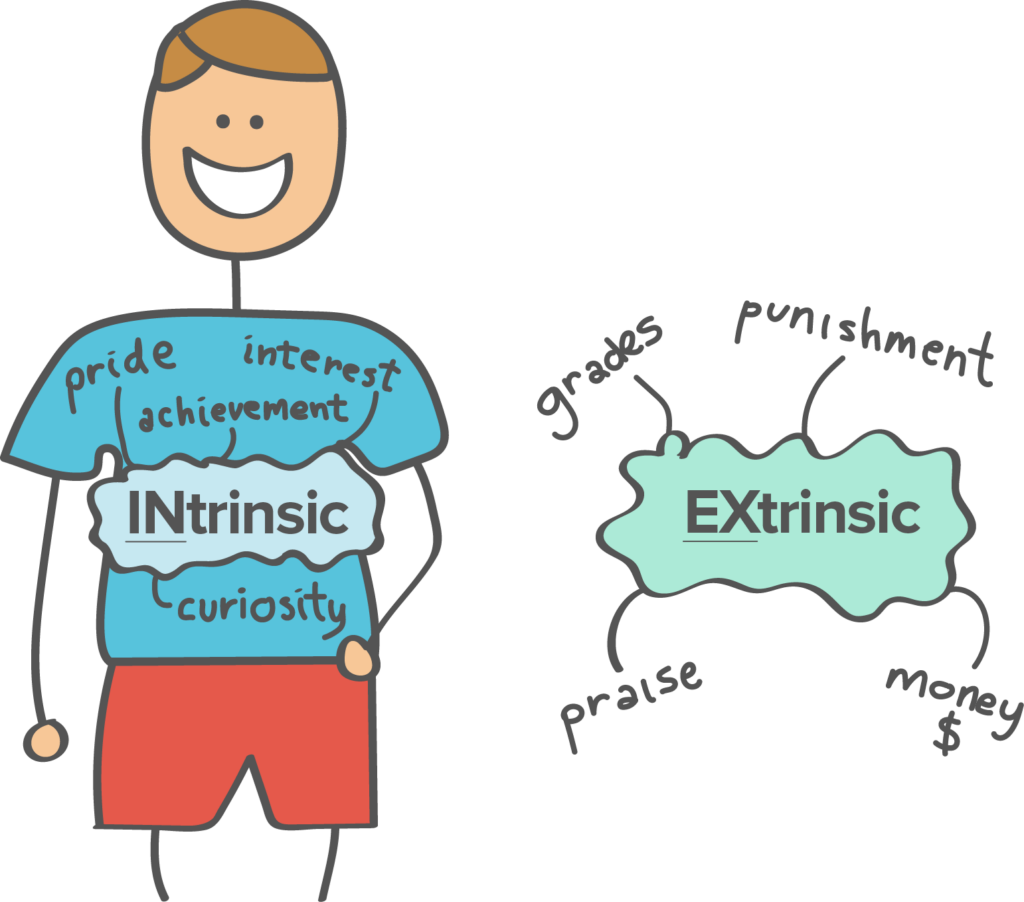
Both intrinsic and extrinsic motivation are important, and most people take both into account when they set goals for themselves. Think about how the two would come into play in my brother’s working environment. Intrinsically motivated behavior improves his work quality – he loves snowboarding and genuinely wants other people to love it too, which is why he wants to be a part of the winter sports industry. Extrinsically motivated behavior improves his work quantity, because as he sells more snowboards, he is rewarded – he gets praise from his bosses, earns more money, and is eligible for rewards. Because he is intrinsically and extrinsically motivated to work in the snowboarding industry he is able to be one of the best representatives in the business – people love his energy and enthusiasm, so he ends up selling tons of snowboards each year and earning a great salary! His situation is pretty typical – most managers will ask you about your career goals and your interests, because if they can find a way to combine what you love to do with your assigned tasks, you’ll be a better, happier (and more motivated!) worker.
Consider the following:
- When you set and achieve goals, you feel happy and are more motivated to continue to set high standards for yourself. Why? The answer is in your brain – when you achieve goals your brain releases dopamine, which is a chemical that is linked to feelings of pleasure.
- Some people believe that the key to achieving a goal is writing it down! When you write down a goal, make sure that it’s specific, outline small discrete steps that will help you achieve your goal, and give yourself an amount of time to complete the goal. For example, instead of “I will lose weight” write down “I will lose 10 pounds in 6 months by running 2 miles three times per week, and taking a yoga class four times per week.”
- Friendships can have a huge impact on your motivation! When your friends are highly motivated to set career or health goals, you are more likely to do the same and be a high achiever yourself.




